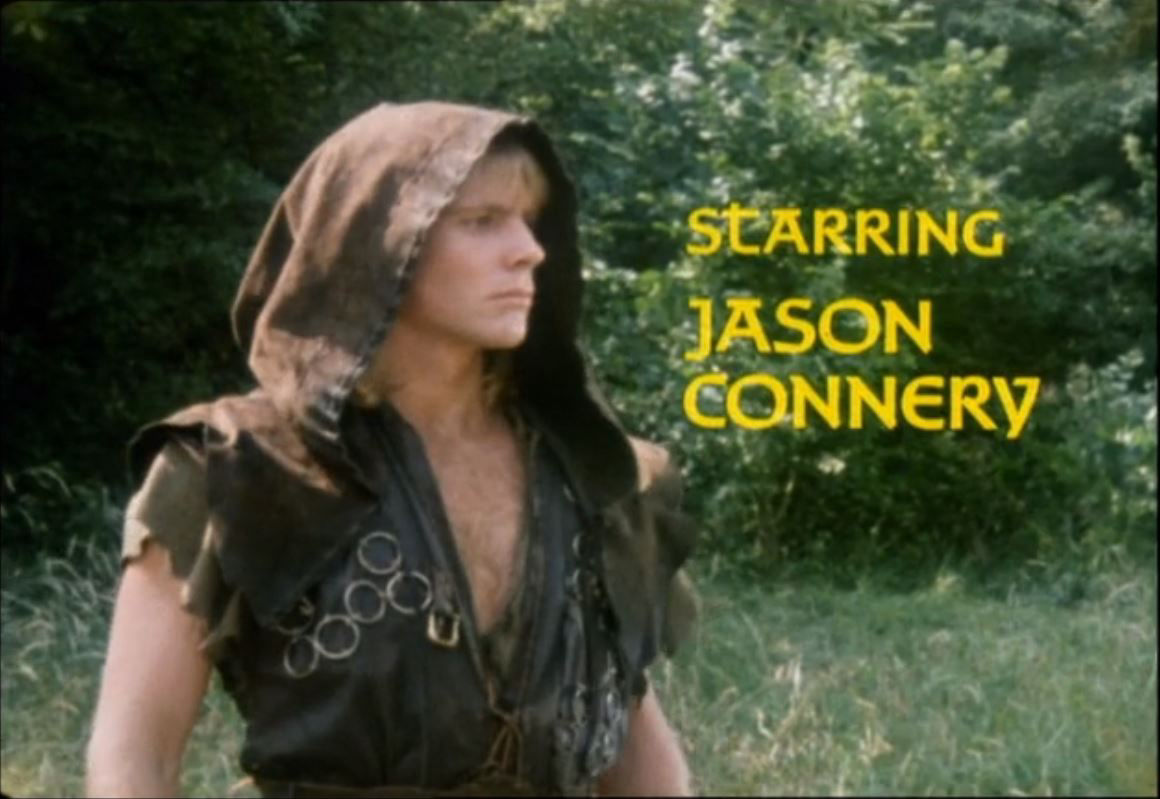

The first televised episode of the next series, the double-length "Herne's Son" picks up moments (despite what the changes of leaves might suggest) after the conclusion of "The Greatest Enemy". However, instead of joining the outlaws, the new Hooded Man (played by Jason Connery) just walks away, telling Herne that he's done enough.
After the rejigged title sequence, the action picks up a year later. We learn that the outlaws have scattered. And we meet the Hooded Man in his true identity -- Robert of Huntingdon, son of the earl. The earl is hosting a banquet to woo a Marcher Lord named Owen of Clun to support King John's campaigns in Wales. Both young Robert and Lord Owen take a liking to one of the banquet's other guests -- a recently pardoned Marion. After the guests leave Huntingdon, Owen kidnaps Marion to be his wife. Her father Sir Richard of Leaford tries to rescue her, but thanks to the betrayal of the Sheriff, Sir Guy and Abbot Hugo -- he fails. When Robert hears what has happened, Robert leaves to find Herne and re-assemble the outlaw band to rescue Marion.
The rescue of Marion seems somewhat reminiscent of "Robin Hood and the Sorcerer" (appropriate as in many ways "Herne's Son" functions as a second pilot). But there is a big difference -- this time, the hero is a nobleman. The idea of a people's hero being a member of the upper class is a problematic element of the legend, and it's one that Richard Carpenter addresses head on when Robert of Huntingdon goes to recruit Little John and Much. It's one of the most powerful scenes in "Herne's Son".
LITTLE JOHN: So, you were the Hooded Man, were you?
ROBERT: I was.
LITTLE JOHN: Then why didn't you join us?
TUCK: He's the son of the Earl of Huntingdon?
LITTLE JOHN: Is he? Is he? Then why don't you get his father to rescue Marion?
ROBERT: Listen.
LITTLE JOHN: You're all the same, aren't you? We saved Marion's father once. Did he join us? No. He bought his way back into favour with King John. Marion was pardoned. Were we pardoned? No. Did Sir Richard lift a finger to help us? We're still looking over our shoulders, aren't we? Still outlaws. Still on the run. And you come here?
ROBERT: You believed in Robin, didn't you?
LITTLE JOHN: Yes, I did.
ROBERT: Why?
LITTLE JOHN: Because the fire burned bright in him. And for a while, it warmed us all. Now he's gone, and the fire went with him. It's all over.
ROBERT: No.
LITTLE JOHN: How could you understand? You? Ever starved? Ever been whipped because you forgot to lower your eyes when your masters rode by? No, not you. Because you're one of them.
ROBERT: Little John. Little Brain, more like.
- Herne's Son Part Two by Richard Carpenter
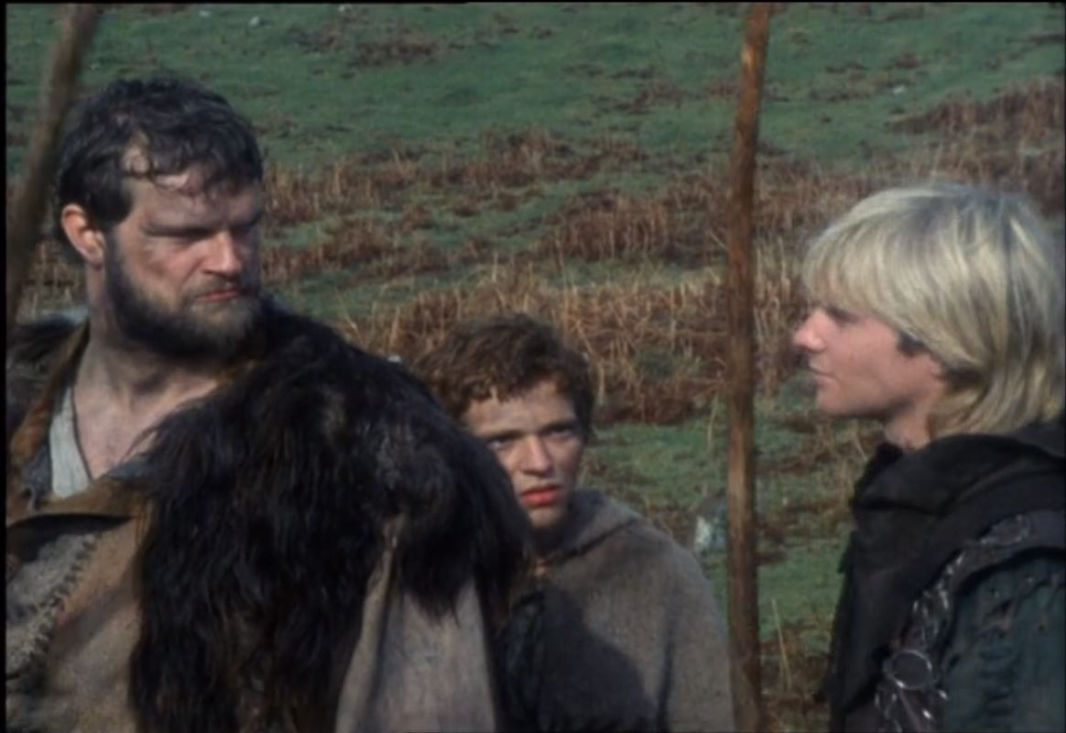
Robert's insult and his incitement for Little John to teach him a lesson is part of a ploy. As in the ballads, the new Robin Hood wins over his men through combat. And yet, coming directly after what Little John said, it still leaves a slightly unpleasant element of smugness. The number of action hero quips that Robert's given in this episode contributes to that feeling. Such humour takes on a different character when said by someone born into privilege.
After the quarterstaff duel, Robert confides in Little John.
ROBERT: Ever since I can remember, my father's told me that one day I would become the Earl of Huntingdon. That was my destiny. That was my duty. Can you understand? When Robin died, Herne chose me to take his place.
LITTLE JOHN: No one can take his place.
ROBERT: That's what I believed. And why I couldn't do it, even though I saw injustice everywhere. I lacked the courage. Then Marion came to Huntingdon. She was pale, lost and her heart was broken. Whatever you think, she's still one of you.
LITTLE JOHN: You're not the only one who lacked the courage. I reckon we all did. I tried to go back to what I was -- a shepherd. But you can't go back, not in your heart.
- Herne's Son Part Two by Richard Carpenter
As I mentioned, what set Robin of Loxley onto the path to embracing his destiny in "Robin Hood and the Sorcerer" was his reaction the complacency of the other outlaws to live within an unjust society. "Herne's Son" returns to this theme. Not only do Robert and the outlaws seem initially unwilling to step up and challenge society again, we also see a "do as you're told and they'll leave you alone" attitude from the Earl of Huntingdon too. Robert's father is not depicted as a cruel or unjust man, but he's unwilling to sacrifice for change. Robert does step up finally, but when he does so, the main impetus for action is to save Marion. He's still heroic and mostly selfless but in the structure of the episode, something is lost.
Future episodes also show some tension between the new Robin Hood and Little John over Robert's noble background. In "Cross of St. Ciricus", Little John notices that Robert is in love with Marion, Robin tells him it's none of his business, adding a somewhat condescending "Do you understand?" Little John replies "Oh, I understand. I know when the earl's son puts me in my place". In the same episode Will says that Robert doesn't want to kill Gisburne because they are the same kind. "Oh, don't worry -- not your fault. Accident of birth." (What Will doesn't know is that Robert has just learned that Guy of Gisburne is his half brother.)
Robert uses his real identity as the son of the earl to go undercover in the second story of the third series, "The Power of Albion". He ingratiates himself to the sheriff, but his role of an outlaw is exposed. It's also in this episode that the people openly call him Robin Hood -- something he reluctantly accepts with Marion's blessing.
After "The Power of Albion" the new status quo is established. Robert of Huntingdon is Robin Hood. He's called Robin by both the people and his band -- including Marion in their eventual romantic moments. The change is even reflected in the end credits where Jason Connery is now billed as Robin. Fans often still call Connery's character "Robert" for the easy ability to distinguish between the characters in discussions. This was not an issue in the show itself, because after "The Power of Albion" the first Robin Hood -- Robin of Loxley -- is never directly and unambiguously referenced again.
Oh, there are hints. The older outlaw Adam Bell is referred to as having been like Robin Hood twenty years ago, and Little John and Robert say the phrase "another Robin Hood" in a particularly knowing fashion. In "The Betrayal" King John berates the sheriff by saying "You swore he was dead", but the sheriff does not clarify that someone new has taken over the role of Robin Hood. Perhaps the villain had just been overconfident about the success of one of his death traps.
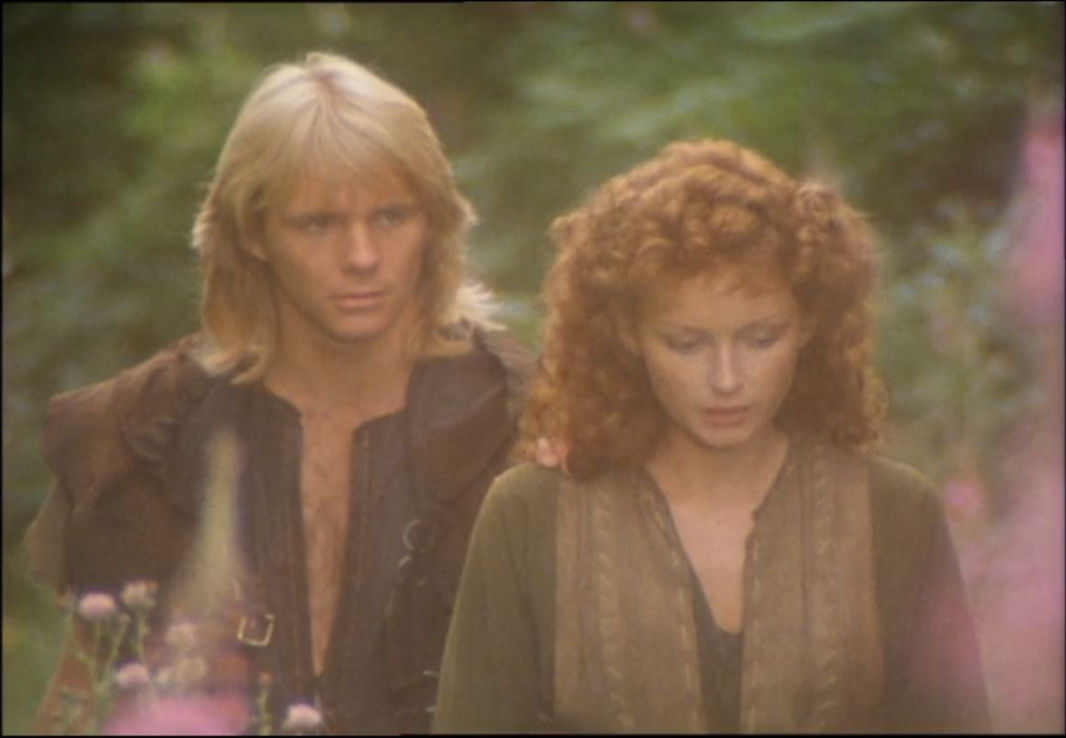
Not surprisingly, the clearest hints toward the earlier Robin Hood comes when discussing the impediments to Robert's tentative romance with Marion. In "The Cross of St. Ciricus", the characters have an awkward conversation about their feelings, and Marion admits to loving Robert, but adds "Perhaps the past is still too close." In "The Sheriff of Nottingham" Marion is frustrated that nothing ever changes. "Where will it end?" she asks. "I don't know," replies Robert. "But I do. I know." Marion says forcefully. It's clear enough to anyone watching these episodes in isolation that she had a personal tragedy of some sort, but not that her lost love was also known as Robin Hood.
You would need to know about the earlier episodes to pick up the true meaning.
And I would know. The first full episode I watched was the Jason Connery episode "Adam Bell". I heard most of the later vague callbacks to the first Robin and they just sailed over my head, not registering for a second that Robert of Huntingdon was the second Robin. I was lucky that shortly before the show was about to rerun from the first episode, I found a school friend who had read the novelization of the third series' opening episodes (The Hooded Man by Anthony Horowitz) and knew about the earlier Robin and even the show's correct UK title. Without that extra knowledge I would have been very confused to find a different Robin Hood in the earlier episodes -- not only a different actor, but a character with a different background. However, even with that extra knowledge as I was loaned off-air VHS copies of some earlier Connery episodes the idea that this was supposed to be the second Robin Hood seemed unbelievable until the earlier seasons reran and I met Robin of Loxley for the first time.
Back then it was important that the writers/producers establish the status quo of Robert as Robin Hood as quickly as possible. The "Golden Age of Television" with its heavy serialization would not occur for several years. Back in the 1980s, there was no Internet to research a show's history and no DVD/Blu-Ray sets or streaming service to binge watch past episodes. With the exception of the first couple episodes needed to introduce Jason Connery's Robin Hood, the episodes stand largely on themselves. There are hints towards previous episodes, vague character arcs -- such Will's rebellion in the second series or Robert/Marion's romance in the third -- that reward the longtime viewer but the show is designed so that viewers can come to nearly every episode fresh.
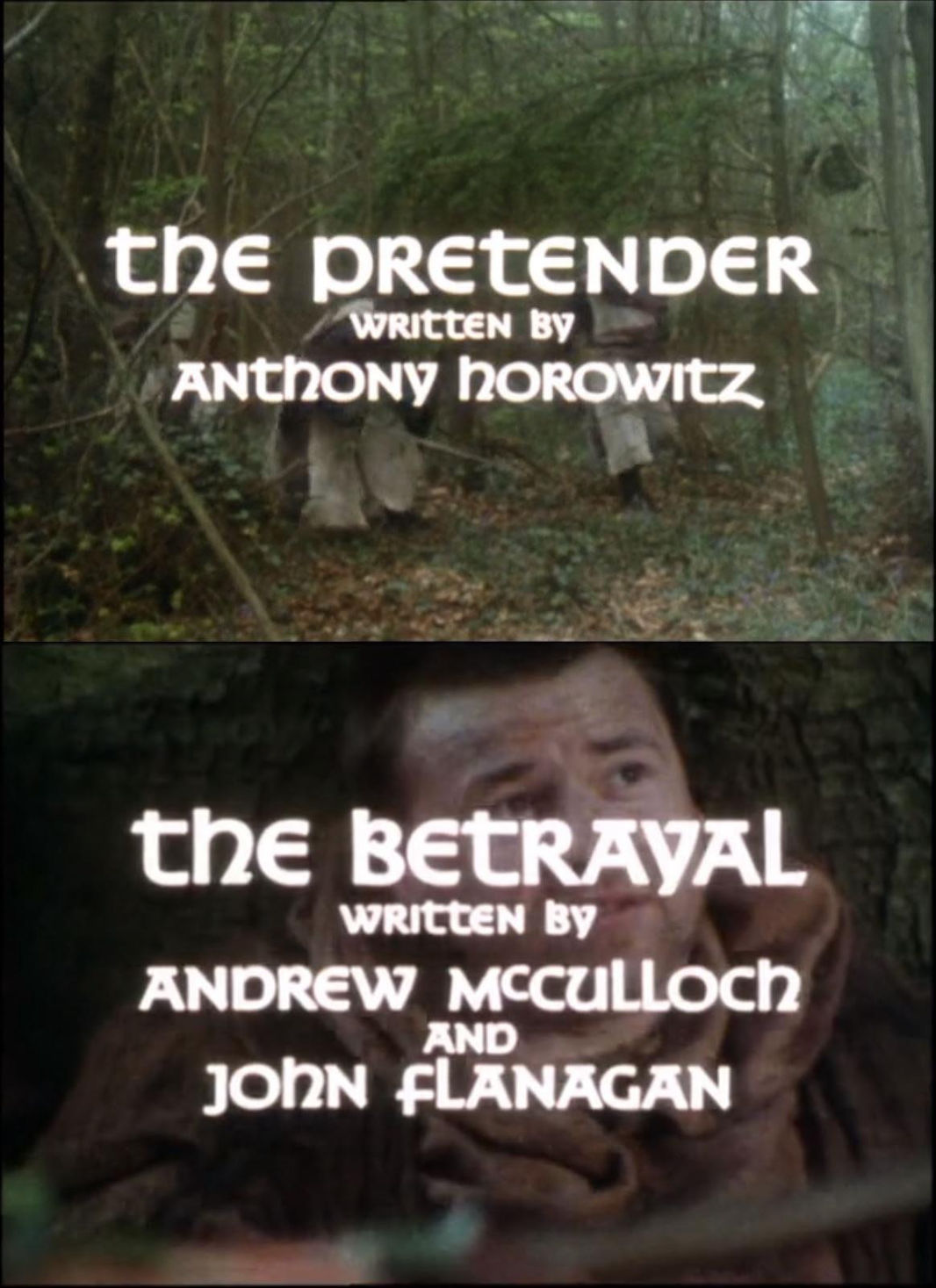
Also, the third series feels very different from the first two series, and not just because there's a new leading man. The show's final season was as long as the first two combined, and new writers were hired. Anthony Horowitz wrote five of the 13 episodes and another was by Andrew McCulloch and John Flanagan. Nearly half the season was written by someone other than series creator Richard Carpenter -- and the tone was very different. McCulloch and Flanagan's "The Betrayal" and Horowitz's "The Inheritance" and "The Pretender" all turn on the deliberate misdirection that the heroes have deliberately betrayed or abandoned Robin Hood, only to reveal later that this was part of a predetermined plan.
But there are changes in the Richard Carpenter episodes too. For example, Connery's Robert of Huntingdon does not have that mystical, visionary quality that Praed's Robin of Loxley had. It's understandable that the two Robin Hoods should not be portrayed in the same way, but an essential entry point into the show's magical side was lost. Praed conveyed a sense that he could see things that others could not. This viewpoint made the magical aspects of the series seem like a hidden world running beneath the one that we know -- giving the magical elements a non-naturalistic quality that in some way allowed the non-magical elements to seem more real. Without that visionary viewpoint, the magic in Huntingdon's episodes seems more mundane, more naturalistic, and so the surrounding world seems less real because of it.
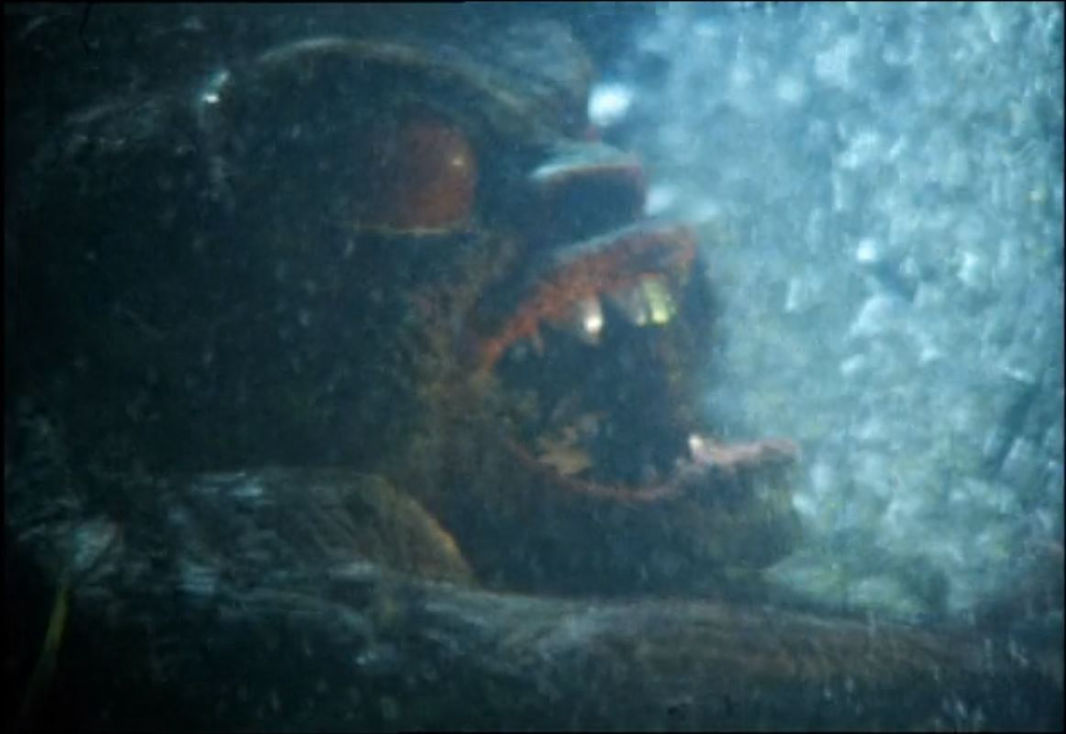
Magic is also more overt this season. In the first season magic was mainly suggested rather than shown. In "Robin Hood and the Sorcerer", Belleme slashes his blade in the air and the wounds magically appear on Robin several feet away. That seemed like high magic -- and yet dreamlike. In the third series, we see a bizarre humpbacked Irish god (that looks a lot like a Troll doll) in "Cromm Cruac" and a clone of Robin Hood brought to life from a clay statue in "The Time of the Wolf". And yet as far out as these fantastic elements are, they are portrayed a lot more mundanely and so make the whole setting seem more like something out of a high fantasy novel. Robert of Huntingdon's godfather is the caretaker of Camelot, and yet this is depicted as part of the normal world. It's also difficult to picture Richard O'Brien's cackling druid sorcerer Gulnar (in a gleeful performance that makes Margaret Hamilton's Wicked Witch of the West seem like a triumph of minimalistic acting) or Oliver Cotton's bellowing Owen of Clun existing in early seasons
Robin of Sherwood ends with the double-length "The Time of the Wolf". Early in the story, things seem to be heading toward a happy ending. Robert proposes to Marion. She accepts. But the big wedding never happens. Instead Gulnar makes a magical duplicate of Robin Hood that wreaks havoc. Robert kills his double, but Marion finds the corpse of the vulpine duplicate and assumes Robin Hood is dead again. She enters a convent to take Holy Orders. Robert comes to fetch her and explains "that was Gulnar's creation -- a copy" (how hard it must be to express a sci-fi plot in medieval terms). But Marion tells him that her heart was broken -- "I can't be your wife, knowing that each day I might lose you. I haven't the strength -- not anymore." Robert shoots flaming arrows in memory of his failed romance, and then joins the outlaws.
In some respects, the last episode brings this full circle. Marion was headed to a life in the nunnery in "Robin Hood and The Sorcerer", and the first story ended with the outlaws shooting flaming arrows into a lake. And yet "The Time of the Wolf" does not feel like a finale. Marion's departure is deeply unsatisfying. This is because when the episode was being made everyone thought the show would be coming back for another year, but that Judi Trott refused to be a series regular. Marion was stuck in a convent so she could be brought out and used in the eventual finale (and possibly a few guest appearances along the way).
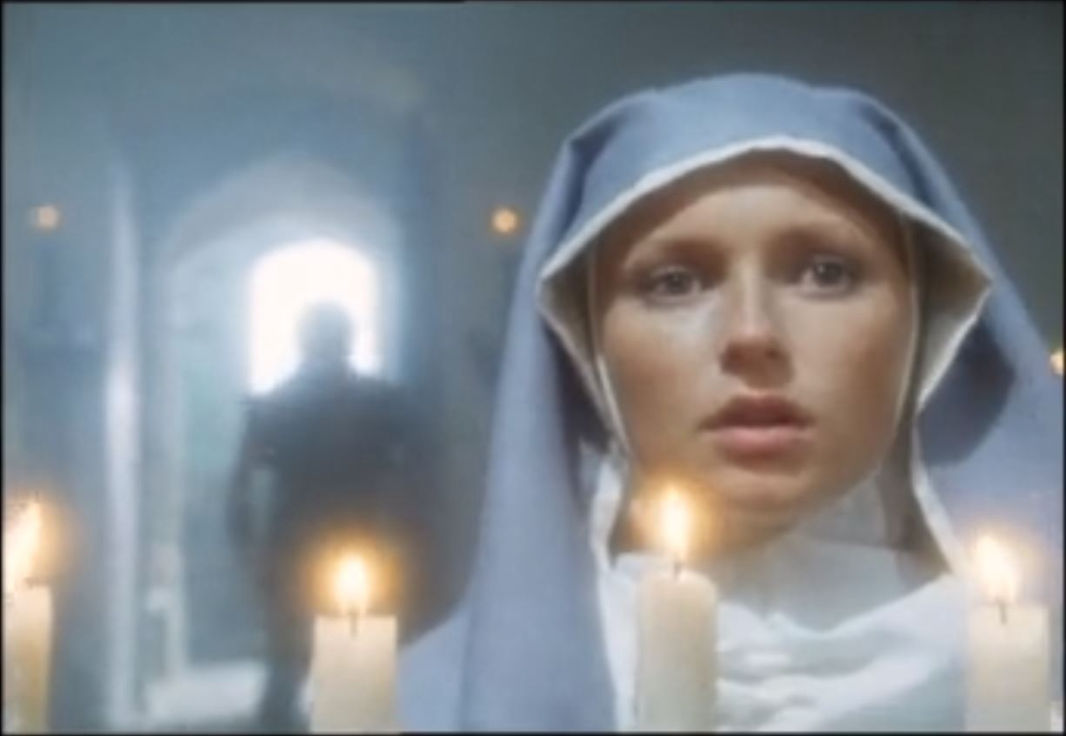
Over the years Richard Carpenter tried to revive the series. In the late 1980s he wrote a movie script that would continue the adventures of Robert of Huntingdon. It was buried among the many competing Robin Hood projects in the late 1980s and early 1990s. (Two of these projects were eventually made in 1991 -- Robin Hood starring Patrick Bergin and the better-known Robin Hood: Prince of Thieves starring Kevin Costner.) In 2015 it was announced that Carpenter's abandoned film script "The Knights of the Apcoalypse" would finally be made as an audio drama -- with all the surviving members of the original cast returning to their roles. The success of the 2016 audio production led to more full-cast audio dramas and audiobooks. (Although impressionist Jon Culshaw filled in for Ray Winstone in the 2018 audio releases.)
An oft-used catchphrase of Robin of Sherwood is "Nothing's forgotten. Nothing is ever forgotten." And fans could see reminders of their favourite show in many later versions of the legend.
The role-playing game supplements Robin Hood: The Role Playing Campaign by Graham Staplehurst (who had previously written two official gamebook tie-ins for Robin of Sherwood) and GURPS: Robin Hood borrow quite a bit from Robin of Sherwood.
Jennifer Roberson's 1992 novel Lady of the Forest featured a blond son of the earl of Huntington who had a troubled relationship with his father, a Little John who was once a shepherd, and a near psychotic Will Scarlet who had killed the four Normans who raped and killed his wife. And yet she does not list Robin of Sherwood in her acknowledgements.
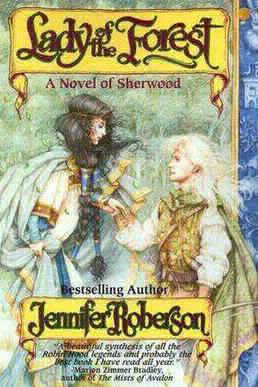
More galling are the uncredited borrowings in the 1991 film Robin Hood: Prince of Thieves starring Kevin Costner. This film was the second highest grossing film in the United States that year and a massive international hit. It also features an angry Will Scarlet, although Christian Slater is more whiny and petulant than Ray Winstone's Will ever was. More lauded is Alan Rickman's delightfully over-the-top performance as the sheriff -- a performance that sometimes resembles Nickolas Grace's. The movie also has a witch and a mob of bloodthirsty Celts that seem close to the Hounds of Fenris in "The Time of The Wolf". The movie even recycles a "I told you to take the one on the left" joke from Robin of Sherwood. Apparently the BFI let Richard Carpenter know that Prince of Thieves director Kevin Reynolds had requested multiple viewings of the TV series for "research".
But the best-known borrowing from Robin of Sherwood in Prince of Thieves and surely the TV show's most enduring legacy was Morgan Freeman's character Azeem -- another Muslim member of the Merry Men. Azeem is different from Nasir and is the product of an American cultural tradition, the wise sidekick and brother-like best friend who represents the other. It's a trope that extends from Natty Bumppo and Chinachgook in James Fenimore Cooper's 19th century novels to Kirk and Spock in Star Trek. For copyright reasons, the name and personality of the Muslim in Robin's band could not remain the same, but it turned up again in the late 1990s TV series The New Adventures of Robin Hood and the 21st century Tiger Aspect/BBC series where the Muslim character was now a cross-dressing woman named Djaq, played by Anjali Jay. In the 2018 Robin Hood film directed by Otto Bathurst, Jamie Foxx plays Little John -- a Muslim whose true name is Yahya.
Even actor Mark Ryan (who played Nasir) borrowed from himself when he co-wrote the 1991 comic book Green Arrow Annual #4. There, Green Arrow's girlfriend Dinah Lance's mind seems to slip back to the past into the mind of Maid Marian for a very Robin of Sherwood inspired adventure. Among the Merry Men is a silent Saracen warrior named Rassan.
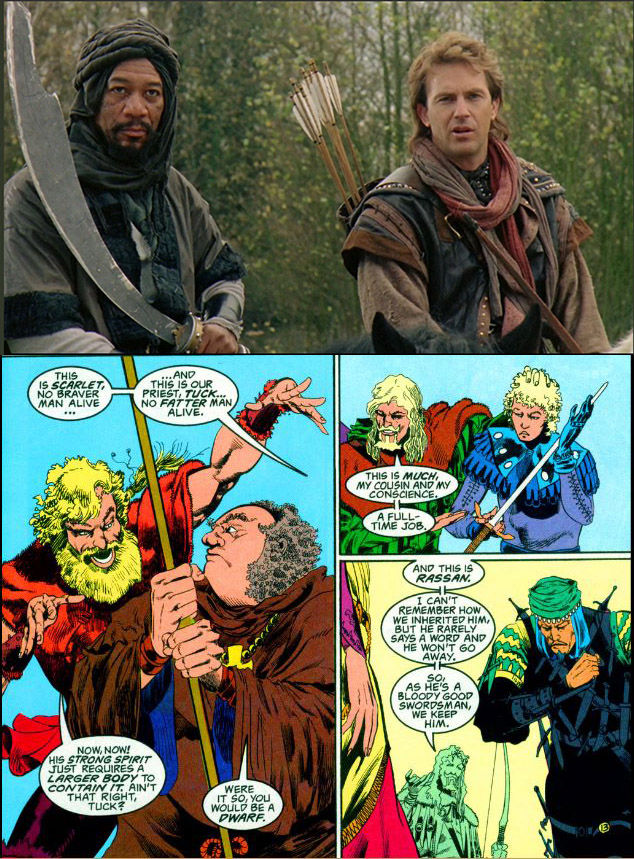
And yet in North America at least, Robin of Sherwood is often forgotten when cataloguing the important versions of the legend. I've fought an uphill battle for its inclusion on many occasions, only to see elements like the Muslim character credited to Prince of Thieves. That's because in some ways the show came 15 - 20 years too early.
In the United States of America, Robin of Sherwood first aired on the cable channel Showtime under the revised and simplified title Robin Hood. In the 21st century cable shows are an important part of the cultural zeitgeist. Showtime's TV show Homeland has been the subject of countless articles, TV news stories ... hell, even President Barack Obama has mentioned it. Cable Television shows might not command the huge audience of regular network shows, but they loom very large on the cultural landscape. But when Robin of Sherwood aired cable television was still very much a fringe thing. If Robin of Sherwood aired today, you can bet it would get a lot more media attention.
Even in the United Kingdom where the show aired on the prominent ITV channels, it was considered family viewing in the Saturday teatime slot. Back in the 1980s this slot was undervalued. On rival BBC, Doctor Who -- which aired slightly later in the day -- was becoming a national joke, much to the irritation of its fans. But in the 21st century, a revived version of Doctor Who is a media darling with high ratings (both in the UK and on international cable channels) and with lots of press coverage. Of course, it would be a very different show if made today. The drama would be more serialized. US cable shows such as Showtime's Homeland and Dexter have season-long arcs, and so do the popular Saturday family shows on the BBC such as the 21st century incarnation of Doctor Who and the BBC's Robin Hood.
Robin of Sherwood may struggle for a place in the public eye and in the official canon of Robin Hood works that are considered important. (Summaries of the legend often dismiss or minimize works that were enjoyed by millions in their efforts to fit a handful of texts into consistent narrative.) But the show is far from forgotten. The crowdfunding campaign for the audio reunion drama reached its pledge goal within a single day (with all profits going to charity). The campaign's success proves that the show lives on in the hearts of many fans. But then you'd never need to convince me of that. These days information is ridiculously easy to find. Wikipedia and the IMDB will provide information about your favourite TV show, and chances are you'll find Facebook groups, YouTube fan videos and more about that show. But back when my site started -- when the World Wide Web was still new and often called "the Information Superhighway" -- information was harder to come by. If a North American even knew the show's correct British title, they were likely a die-hard fan. If you weren't in the know, you might find yourself wondering if you were the only person to watch the show. And when people would email my site -- or sometimes just talk to me casually upon finding out I was a Robin Hood expert -- I'd often hear variations of the following phrase. "There was this show I used to watch, you've probably never heard of it, but..." Even if Michael Praed and Jason Connery don't make the cover of Time or Entertainment Weekly, even if the show gets left out of books on the greatest television shows, even if its innovations are credited to Prince of Thieves in newspaper articles, there are people out there who remember, because ....
Well, you know the catchphrase. And if you don't, maybe it's time you watched Robin of Sherwood.
PREVIOUS: The Roots of Robin of Sherwood - An episode-by-episode look at the connections to previous Robin Hood stories
NEXT: Robin of Sherwood on Lord Raglan's Scale - Assessing the TV series and the Robin Hood legend against a classic folklore scale
Contact Us